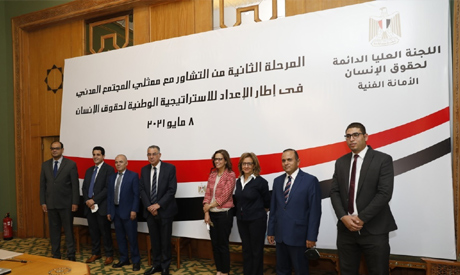
Egypt's Permanent Higher Committee for Human Rights
Egypt’s Supreme Standing Committee for Human Rights held a meeting on Saturday with several civil society representatives and public figures to discuss a national draft strategy for human rights.
According to an official statement, Ambassador Alaa Roshdy, Deputy Foreign Minister and acting Head of the Technical Secretariat of the Supreme Standing Committee, said that the committee sees civil society organisations as key partners in the process of strengthening and preserving human rights in all dimensions.
Saturday’s session saw discussions on the highlights of the draft strategy and its goals, the statement said, followed by a constructive and open dialogue on the observations and proposals of the participants.
The participants praised the state’s initiative to formulate the strategy and the higher committees' openness to various views and proposals.
The session also saw discussions on related challenges and issues on bolstering human rights as well as their views over the best ways to address them.
Roshdy said that the strategy is a new phase for strategic planning in the field of human rights, adding that some issues require determining the best means to tackle them through continued constructed dialogue with various parties concerned, including civil society.
He also said that the strategy is to adopt a comprehensive and serious approach to bolster fundamental rights that are characterised by visionary and strategic directions in planning.
It is also an ambitious national roadmap for human rights and a main instrument for self-development in the field, he said, adding that the initiative on the strategy formulation reflects the presence of political determination to jump-start related national efforts, he added.
The timeframe for implementation of the strategy extends to up to five years starting mid-2021, he said, adding that the strategy focuses on four main lines of action, including political and civil rights as well as economic, social and cultural rights.
They also cover women, children and the youth, along with the elderly and people with special needs.
According to statement, the meeting comes under the second stage of consultations over the strategy being formulated. The first stage saw six meetings in December and January.
The meetings held since last year were attended by representatives from the National Council for Human Rights, civil society groups, trade unions, research centres, universities Federations of Chambers of Commerce, businessmen associations and public figures.
Short link: